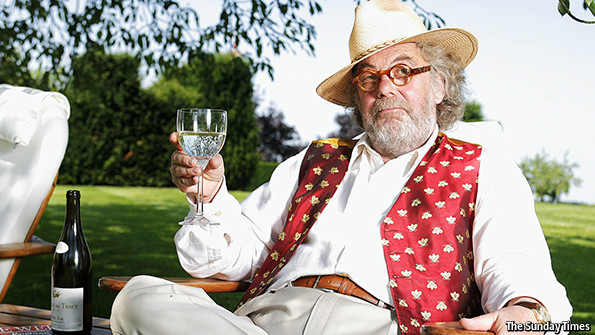Butler and Tanner, Somerset, was Britain's oldest color book printer which Mr. Dennis had rescued in 2008 but could never really get profitable. He operated it at a breakeven/loss for six years.
Among his other philanthropies were the Heart of England Forest Project, the National Library for the Blind and The Printing Charity.
We visited Mr. Dennis a couple times in 2013:
“If it flies, floats, or fornicates, rent it. It’s cheaper.”
That's Felix Dennis quoted at the WSJ's now defunct Wealth Report in"How to be ‘Comfortably Poor’ on $3 Million".From The Economist:
I was thinking of Mr. Dennis because of our earlier "Branson to Accept Bitcoins for Space Travel".
And the connection gentle reader asks warily?
From "Some Advice for Our Younger Readers: How to Get Rich":
...As to Mr. Dennis, I think of him as a poor man's Richard Branson with a self-made net worth of around £500 Million. Younger readers may know him as the former owner of Maxim or MicroWarehouse.

SOMEWHERE in the hearts of all self-made wealthy people, said Felix Dennis, is a “sliver of razored ice”. He liked being rich, and liked advising people about how to achieve that enviable state. But making money, and then yet more of it, was to assuage inner demons, not to achieve happiness. Indeed what made him happy (and that only occasionally, he stressed) were modest pleasures: “Walking in the woods alone, or deeply ensconced in composing a difficult piece of verse, or sitting quietly with old friends over a bottle of wine, or feeding a stray cat.”
Fun and success, however, were another matter. To say he lived high on the hog would be an understatement. By his own estimate he spent $100m on drugs, drink, women and high living in just one decade. He had 14 mistresses on his personal payroll (“If it floats, flies or fucks,” he once said, it was better to rent than to buy.)
He could afford either. His publishing empire, by his death worth hundreds of millions of pounds, started when he turned up at the office of a backstreet rag called “Oz”. He was penniless, having sold his drum kit to pay for a girlfriend’s abortion. Minds met, and he became co-editor—only to end up in jail, briefly, on an obscenity charge when the “schoolkids” issue featured Rupert Bear, a children’s comic-strip character, deflowering “Gipsy Granny”. The judge sniped that the scruffy youngster was “very much less intelligent” than his two co-defendants.
If so, it did not hold him back. His publishing genius lay in spotting gaps in the market and launching titles to fill them. When he saw youngsters queuing in the street in Soho at 9am to watch Bruce Lee films, he launched “Kung-Fu Monthly”, flying to Hong Kong to interview the maestro, who conveniently then died, mysteriously: the media blackout which followed made his material sizzlingly interesting.
When the titles flourished, he licensed them in other countries, or sold them and started new ones. His later successes included the laddish “Maxim” and “The Week”, a lively digest of other outlets’ content. Its huge success in America confounded cynics who thought that the magazine market there was moribund.
He was no great editor and had mostly no interest in the subjects of his titles. Though he made a fortune from computer magazines, he abhorred gadgets. He found management boring too, revering cashflow, but boasting that he could not read a balance-sheet. Why bother, when you could hire people who could?
The secret of getting rich, he reckoned, lay in using other people’s talents—finding them, nurturing them, rewarding them, and when necessary dispensing with them. On top of that you needed persistence, practicality, stinginess, innovation, ruthlessness and fearlessness. The greatest hurdle to fortune was the desire for safety—as addictive as his beloved crack cocaine, but much worse for you, he said.
Biology caught up with him. He nearly died from Legionnaires’ disease, which, he wrote, is “especially lethal to coked-up, overweight, cigarette-smoking, malt-whisky-swilling idiots with too much money who believe they are built of titanium”. Having survived a nurse pouring icy water on his genitals to keep him from falling into a coma, he eventually resolved to ditch the drugs and took up a five-hour-a-day poetry habit instead....MORE